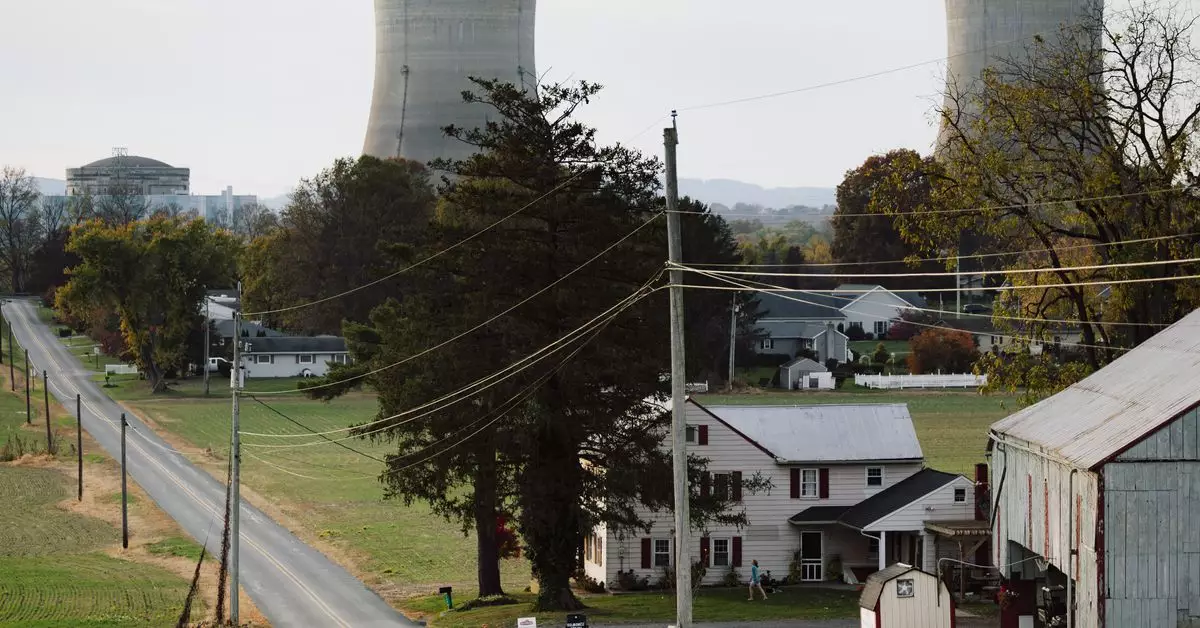The landscape of energy consumption in the United States is evolving rapidly, spurred on by increased demand from burgeoning technologies such as artificial intelligence and cloud computing. In this context, the U.S. General Services Administration (GSA) has revealed a groundbreaking ten-year contract valued at $840 million, covering the procurement of 10 million megawatt-hours of electricity. This contract is not only a significant investment in nuclear energy but also signifies a seismic shift in how the federal government approaches sustainable energy solutions.
As the nation grapples with escalating electricity demands, particularly from powerful AI data centers, nuclear energy emerges as a viable solution. The GSA’s recent contract is monumental, as it is projected to provide power sufficient for more than one million homes annually. Awarding this contract to Constellation, America’s largest operator of nuclear plants, highlights a clear acknowledgment that nuclear energy is vital in meeting both current and future energy needs. Constellation’s commitment to producing primarily carbon-free energy, predominantly through nuclear power, reinforces this point, as the company accounts for approximately 10% of the nation’s low-carbon electricity.
Moreover, the deal forms part of a broader trend; major technology firms, including Microsoft and Google, have also invested in nuclear initiatives as they strive to mitigate their carbon footprints and ensure energy reliability. The need for dependable energy sources is paramount, especially as these companies navigate intense competition for clean energy to power their operations.
The GSA’s contract marks a transformative moment for federal energy procurement. In the past, nuclear energy often faced exclusion from sustainable energy discussions within corporate frameworks and government strategies. However, with the GSA’s encouragement of nuclear energy adoption, organizations such as Constellation can expand their capacity and innovate further. Joe Dominguez, the CEO of Constellation, articulated this shift by stating that the federal government is joining notable corporations in paving the way for continued investment in nuclear energy.
This procurement is not merely a transactional agreement; it reflects an evolution in federal energy policy. The GSA’s contract will aid Constellation in extending the operational licenses for existing nuclear plants and in investing in new infrastructure. Additionally, the anticipated gain of 135 megawatts of new capacity underlines a commitment to enhancing the reliability of the energy grid across multiple government agencies, including the Departments of Veterans Affairs and Transportation.
As energy prices fluctuate and demand continues to rise, this contract provides federal agencies with a safety net against price volatility. By locking in rates for a decade, the GSA ensures budgetary predictability while also supporting the domestic nuclear sector. This move comes at a crucial time when conventional energy markets face uncertainties and when demand from data centers is intensifying.
The foresight shown by the GSA in securing a cost-effective and reliable energy source cannot be overstated. In doing so, it opens doors for future infrastructure projects that align with the nation’s sustainability goals, directly responding to the needs of both government and corporate sectors grappling with their energy footprints.
The Biden Administration recognizes the need for a diversified energy portfolio as it pushes for a transition away from fossil fuels. Nuclear energy is positioned as a vital player in this transition. Furthermore, recent initiatives like the $1.52 billion loan from the Department of Energy to restart a previously closed nuclear facility illustrate a concerted effort to renew and bolster the nuclear energy framework in the U.S.
The participation of tech giants in nuclear energy deals, such as the restarting of a reactor at the infamous Three Mile Island, represents an exciting chapter in the narrative of nuclear energy’s resurgence. It implies a growing acceptance and strategic importance placed on nuclear energy as a clean, reliable energy source for addressing climate change and energy security.
The GSA’s announcement of its nuclear energy contract marks a firm commitment to embracing nuclear power as a cornerstone of U.S. energy policy. As the federal government aligns itself with corporate leaders to develop innovative energy solutions, nuclear energy is set to play a pivotal role in the shaping of a sustainable and reliable energy future. The ripple effects of this strategic decision are sure to impact both the nuclear industry and national energy landscape for years to come, heralding an era where nuclear energy is not just an option but a vital player in fulfilling America’s energy needs.

